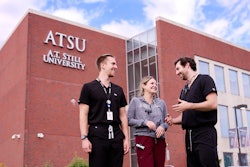An applied sociologist by training, Dr. Laura N. Gitlin grew up fascinated with the ways people and their families – including her own family – adapt to adversity and interact with the health care system.
Today, that fascination has transpired into a number of psychosocial environmental home and community-based interventions the researcher-practitioner has developed with interprofessional teams to address serious health conditions such as dementia and Alzheimer’s disease, cognitive decline, chronic disease management and other health challenges that aging adults often face.
In her critical research on aging, Gitlin has worked with nurses, occupational therapists, physical therapists, social workers, geriatricians, general psychiatrists, physician assistants and more. Her work challenges the health system to understand people in their environments and how their access to food, proper nutrition and social engagement, for instance, are all as critical as, or even more important than, monitoring their blood pressure or providing the appropriate medication, she says.
“I learned very early that it isn’t one profession and that people need a lot of different things,” says Gitlin, Distinguished University Professor and dean of the College of Nursing and Health Professions at Drexel University. “I think that’s what keeps us going when you can connect to a passion that is relevant to one’s own background.” Gitlin adds that, as a researcher, it is rewarding to come across an “aha” moment when the data uncovers something that has never been understood before. Even further, she enjoys making a difference by introducing particular health care strategies and receiving feedback and comments from health studies participants about their care.
“It’s quite a thrill,” she says. “You’re collecting the data, but you don’t know how it’s going to turn out, and then if the results are good – and even negative findings can be informative – there’s nothing like it. It kind of keeps you going and it’s very, very rewarding.”
Gitlin received her bachelor’s degree in anthropology from Temple University and a master’s and Ph.D. in sociology from Purdue University.
She is the current chair of the Health and Human Service’s advisory council for the National Alzheimer’s Project Act and a recent appointee to the Alzheimer’s Association medical advisory board. She is also a member of the American Academy of Nursing, the American Occupational Therapy Association, the Gerontological Society of America, the New York Academy of Sciences and the international Lancet Commission on dementia care.














